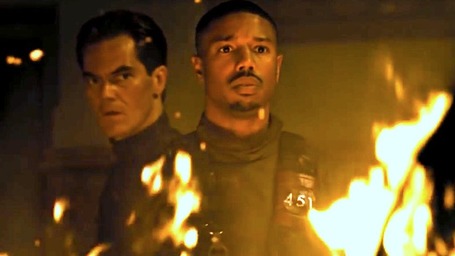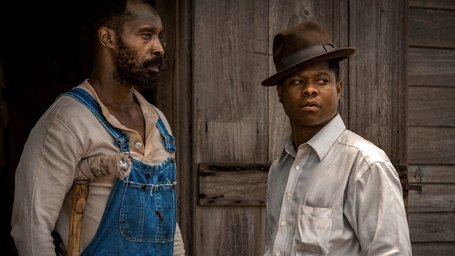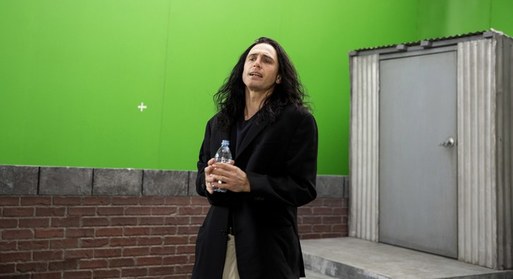D | A fireman entrusted with burning the nation's books has a crisis of conscience. Directed by Ramin Bahrani Starring Michael B. Jordan and Michael Shanon Initial Review by Jon Kissel |

 HBO’s original programming, consisting of series, movies, and miniseries, have a clear laggard in that trio. The movies don’t have anywhere near the cultural persistence that either series or miniseries have, despite HBO’s considerable marketing and development prowess. The standard format for feature-length films are adaptations of real events, and the strictures of sticking to history don’t let the actors do much more than impressions of well-known figures while the directing is utilitarian A-to-B event tracking. These are sometimes great, like the you-are-there history of Path to War or Conspiracy of the early-aughts, but have lately been Al Pacino in a series of bizarre wigs or make-up as he trolls for Emmy awards by playing disgraced public figures. Literary adaptations are more comfortable in the miniseries category (Empire Falls, Olive Kitteridge), and after reading the Wikipedia plot description of Ray Bradbury’s Fahrenheit 451, that may have been the better route. Ramin Bahrani attempts to cram a lot of plot and character motivation into 100 minutes, and ends up exchanging believable arcs and actions for ostentatious camera movement and bludgeoning political satire. If this is the art that survives the Second Civil War, we’re in trouble.
4 Comments
 The Iron Giant takes place back when America was great, and all that that implies. Monochromatic coastal hamlets, packed diners, and comfortable blue collar work keep everyone happy and docile, painting a picture of ideal life with no conflict or disagreement. This bubble is in danger of popping from contagions all around. Sputnik beeps across the upper atmosphere. A filthy beatnik is running the scrap yard. Most of all, a sentient robot alien is romping through the forest, chomping on cars and recklessly exploring. Brad Bird’s stellar debut uses these interlopers to tell a big-hearted story of courage and wisdom. He mixes cultural commentary on an insular and paranoid time with the kind of raw emotion and epiphany that works so well on this viewer.
 A multi-part oral history of mid-20th century Mississippi, Dee Rees’ Mudbound feels familiar and unique at the same time. Black people toiling under the thumb of Jim Crow has been visited in films like Mississippi Burning, The Butler, Loving, The Help, and plenty of others. These kinds of stories often have the pure criminality of the KKK lurking around the corner, with virulent racists crafting a picture of evil so palpable that it’s almost manipulative. When there isn’t a family of noble sufferers weathering this storm, there’s benevolent white people around to serve as middle men or in contrast to the cross-burners, like these white people are ok and in no way complicit. Mudbound has some of those tropes, but it also holds them at arm’s length and broadens the tapestry. Rees is engaging with previous kinds of these stories, often to Mudbound’s detriment, but by including so many perspectives amongst the two central families, she’s pushing deeper than films like this usually go.
 The Room is a singular work of filmmaking, in that no other person could make it but Tommy Wiseau at this one exact moment in time. As dreadful as it is, The Room does make a person consider what a good film even is. Is it more fun and entertaining to watch The Room than the average mildly entertaining, competent movie? I would say 100%, yes. It binds people together in ritual and shared experience. It’s an original vision powered by sheer will and a jeans fortune, or something, that gives the viewer a significant look into the creator’s head. I’ve read and listened to some overheated praise for The Room, and while its most fervent adherents make some good points about art and the criteria of ‘good,’ what cannot be argued about is how despicably misogynist and nakedly narcissistic the actual movie is. If Wiseau put so much of himself into the film, the picture that comes out of it is one of a delusional man who hates women, who has no talent for self-inspection, who’s so prideful that he can’t ask for help when he’s painfully outmatched. The pleasure I take from The Room is gleeful derision that someone so obviously awful could fail so spectacularly. He is not admirable. James Franco’s The Disaster Artist disagrees, and in a particularly irritating way. It sees the value in Tommy’s effort even if what it was used for is an execrable catastrophe worthy of all the derision it receives, and more. |
AuthorsJUST SOME IDIOTS GIVING SURPRISINGLY AVERAGE MOVIE REVIEWS. Categories
All
Archives
April 2023
Click to set custom HTML
|